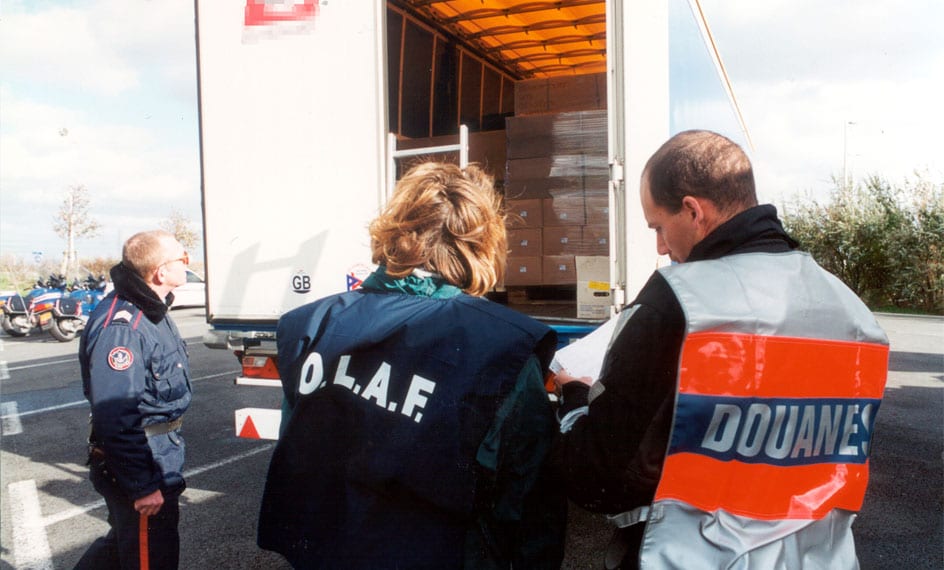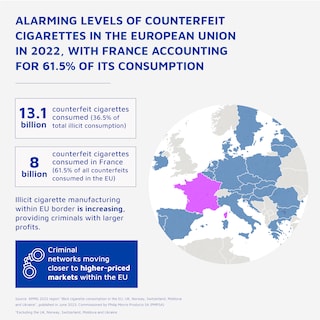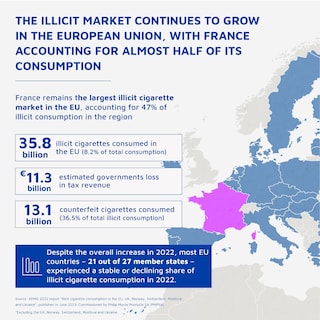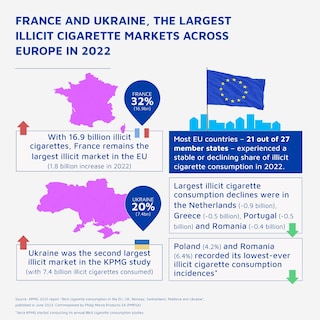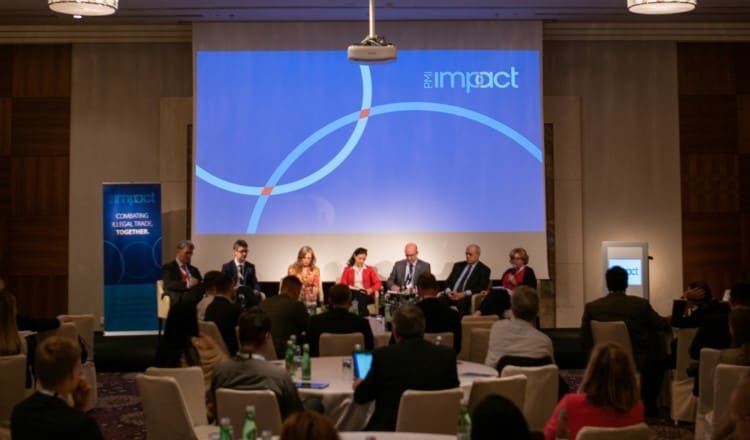A problem without borders
The independent 2022 KPMG annual study on illicit cigarette consumption in the EU, U.K., Norway, Switzerland, Moldova, and Ukraine has revealed alarming levels of counterfeit cigarettes within the EU, with organized criminal groups continuing to set up illicit production facilities within its borders, mainly targeting Western European, high-priced markets such as France. “Fake cigarettes are being manufactured, distributed, sold, and consumed in countries within the EU, undermining efforts to reduce and eliminate cigarette smoking—and public health goals altogether,” said Gregoire Verdeaux, Senior Vice President, External Affairs, PMI.
However, the illegal cigarette trade is not confined within the EU’s borders. In fact, illicit cigarettes continue to enter from outside the regional bloc. That’s why concerted action within the EU can have a global impact. We’re committed to encouraging open dialogue about the most effective ways to combat illicit trade in tobacco products by involving manufacturers, suppliers of key components, technology providers, customs authorities, and other law-enforcement agencies.
We strongly support the objectives and principles of the WHO Framework Convention on Tobacco Control’s (FCTC’s) Protocol to Eliminate Illicit Trade in Tobacco Products (“the Protocol”) and are encouraged by the growing number of countries joining this international treaty. We are convinced that the FCTC Protocol will help the EU gain the upper hand in fighting the black market in tobacco products and will pave the way for controls in tracking and tracing, licensing, and due diligence.
Illicit cigarette consumption in the EU, U.K., Norway, Switzerland, Moldova, and Ukraine in 2022
(Click on a country or use the magnifying glass to see figures from each country)
The KPMG annual study noted that 35.8 billion illicit cigarettes were consumed across the EU alone in 2022, causing governments the loss of an estimated EUR 11.3 billion in tax revenue—8.5 percent more than in 2021. The growth of the illicit market in the EU was partly driven by the continued rise of counterfeit consumption, which reached its highest level ever recorded. Notably, the vast majority of counterfeits (61.5 percent) were consumed in France.
According to interviews with law-enforcement agencies included in the KPMG report, the production and distribution of counterfeit cigarettes within EU borders is increasing—with criminal organizations centering their activities toward higher-taxed and higher-priced EU member states—and gaining larger profits. Countries such as Belgium, Denmark, France, and Germany are witnessing a growth in cigarette seizures and raids on clandestine manufacturing operations.
Despite the overall illicit consumption increase, the KPMG study notes that the majority of EU members—21 out of 27 countries—experienced a stable or declining share of illicit cigarette consumption in 2022. Excluding France, overall illicit consumption in the EU member states declined by 7.5 percent, largely due to decreases in Greece, the Netherlands, Portugal, and Romania. Notably, in countries such as Poland and Romania, illicit consumption reached the lowest-ever incidence since KPMG began publishing its annual studies.
“Effective policymaking, fiscal calendars, deterrent penalties, and impactful enforcement are enabling several EU member states to experience a decline in the consumption of illicit cigarettes,” said Massimo Andolina, President, Europe Region at PMI. “In other countries, it is unfortunate to witness the legal market shifting toward one that is run by criminal networks. The KPMG report should serve as a wake-up call for regulators and policymakers in the EU to consider that millions of consumers are relying on the black market to continue smoking.”
“The KPMG report clearly shows how the growth of the illicit cigarette market poses an existential threat to the industry’s sustainability and transformation in Europe,” stated Verdeaux. “We can observe how the illicit cigarette problem in the EU has become highly concentrated in a handful of countries, where governments have not embraced innovative approaches to effectively deter millions from continued smoking,” he added.
For PMI, eliminating the illicit tobacco trade has been a long-standing priority. We rely on the latest technology to secure our supply chain and protect our products, while implementing preventive and protective measures to fight illicit trade and working with public and private sectors to advance efforts against this global issue. PMI continues to support relevant regulations like the FCTC Protocol to Eliminate Illicit Trade in Tobacco Products and the EU Tobacco Products Directives’ tracking-and-tracing provisions.
Effective supply chain controls are key to how we run our business in the EU and beyond
These measures include:
Cooperating with the EU and its member states
In 2004, Philip Morris International, the European Union, and 10 of its member states signed a 12-year cooperation agreement, which by 2009 was ratified by all 28 member states. The purpose of the agreement was to coordinate efforts in combatting illicit trade in PMI brands within the EU.
As part of the agreement, we introduced stringent record-keeping, screening standards for potential business partners, and strict control of cash payments. We also provided USD 1.25 billion in funding to the Commission and member states to underpin these efforts over the course of the agreement.
"This agreement has served its purpose, reducing PMI contraband on the illicit tobacco market and providing public revenues of around USD 1 billion to member states and the EU budget. In a changing legal and market environment, we will redeploy our resources and continue to fight illegal tobacco trade by focusing on cheap whites, strict law enforcement, and strengthened international cooperation."
Kristalina Georgieva, former EU Commissioner, following the agreement’s expiration in July 2016
Results from the 2016 EU Commission report
The anti-contraband and anti-counterfeit cooperation between PMI and the EU has been highly successful.
- 85 percent drop in the volume of genuine PMI cigarettes seized by member states between 2006 and 2014. The 2016 EU Commission report states that the PMI agreement has effectively met its objective of reducing the prevalence of PMI contraband on the illicit EU tobacco market as demonstrated by an 85 percent drop in the volume of genuine PMI cigarettes seized by member states between 2006 and 2014.
- 87 illegal cigarette factories were raided, inspected, and shuttered. Thanks to PMI’s support of investigative work and analysis of counterfeit cigarette seizures in the EU, investigators could establish links between different smuggling routes. The result of these efforts is the closure of a substantial number of illegal cigarette factories in the EU.
- Close to 50 percent of total PMI volume is covered by carton-level tracking and tracing. PMI has been progressively moving from master-level to carton-level tracking and tracing. Our products are tracked at the master-case level
in over 120 countries. Now, close to 50 percent of our total volume, including duty free, is covered at the carton level. We have also informed authorities that we expect to increase pack-level tracing, prior to it becoming mandatory in the EU
under the Tobacco Products Directive.
-
KPMG Report - Illicit cigarette consumption in the EU, UK, Norway, Switzerland, Moldova and Ukraine - 2022 Results
-
KMPG: Illicit cigarette consumption in the EU, UK, Norway and Switzerland—2021 results
-
KMPG: Illicit cigarette consumption in the EU, UK, Norway and Switzerland—2020 results
-
KMPG: Illicit cigarette consumption in the EU, UK, Norway and Switzerland—2019 results
-
Project Stella: Illicit cigarette manufacturing in the EU—November 2019
